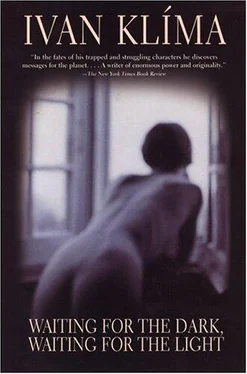He's sitting in a small salon off the main rooms. They wedge him in among his special black guests on tiny rococo chairs and ply him with caviar, alcohol, delicious salads, crab meat, stuffed artichokes, shrimps. An ugly, bespectacled interpreter is standing just behind him, droning
on and on in her high, wheezing voice. As soon as that cannibal to his left flaps her thick painted lips three times and utters a few incomprehensible sounds, the woman behind him dumps a load of words on him so rapidly he can't concentrate on a single thought of his own. Fortunately, they've trained him how to behave in situations like this. Every once in a while he throws out a 'How interesting!' and smiles. Then he turns to her spouse, recommends that he try a sip of his favourite drink, then raises his glass and proposes that they drink to the struggle against capitalism, colonialism, neocolonialism, Zionism, racism, apartheid; to the war against poverty, hunger, illiteracy, corruption, crime, disease and exploitation. And when his guest, a huge man who lounges in the imperial chair as if to the manner born, as if, not so long ago, he hadn't lounged about on the banks of the Nile, or whatever river it was, among the hippopotamuses and the crocodiles, nods patronizingly to indicate that yes, he approves of such toasts, the president empties his glass and then announces that to add spark to the programme he has prepared something a little unorthodox. Given his guest's legal training, he might perhaps be interested in the case of a terrorist, who, with a second terrorist, hijacked a bus full of children. He's already been sentenced and has naturally been given the greatest punishment, but before he makes a decision on the man's request for clemency, he wants to hear him out personally. A thousand years ago his predecessors did things the same way. He had intended to have the hijacker brought to him some time in the next few days, but because of his guest, he has decided to do it right here and now.
The black guest nods, emits some incomprehensible sounds which the interpreter puts into comprehensible words strung together in utterly confused sentences. What does it matter? He is not here, after all, to contemplate the ruminations of someone whose parents grew up in the jungle. He'll show him the prisoner. Let his guest see for himself that all the talk about the horrors of unfreedom and biased courts in this country is merely the slander of malevolent enemies. He'll show him an outcast justly condemned to death. He will then talk to this outcast and hear what he
has to say. He understands people like that because he has been a hair's breadth from the gallows himself. Where else in the world can you find the head of a civilized state willing to do that? He has even had a special room prepared for the event. That is, if his staff have obeyed his orders and brought him the chair in which his predecessors used to sit a thousand years ago. Then he will decide. He might even grant the prisoner clemency. Why shouldn't he? The world holds mercy in higher regard than punishment, however just. He can point to this act of mercy when his enemies malign him. He is only exercising his rightful powers. Besides, he who grants clemency holds power firmly; he rules. They know that very well, which is why some of them made rather sour faces when they understood his purpose.
He has worked the whole thing out wonderfully well, and feels satisfied with himself. He feels the old determination surging through his veins. He's even being a good host. 'Make yourself at home,' he says turning to his black guests, 'as though you were with your own people. All of this is yours. Let friendship flourish between us and the people of our countries, today, tomorrow and forever!' As he says this he looks into the garden where, over the heads of all those fancy-dressed scarecrows out there, geysers of colourfully lit waters explode into the air. 'No more the horrors of war, colonialism and subjugation!' He listens contentedly as his interpreter translates his pointed and comprehensible words into wads of shrill, inhuman sounds. 'For a free tomorrow, and against all those who would suck people dry and lead them astray,' he goes on. 'No more the rule of lords or clerics. . '
His big-eared chancellor, who is sitting just close enough not to miss a word, is shaking his head almost imperceptibly. What is he trying to tell him? Probably that this black charlatan is, on top of everything else, an archbishop or a shaman, if not some kind of local deity, and that he should be careful not to offend him. Has it reached the point when he has to watch what he says and what he thinks in his own home, in his own country?
He lifts the goblet to his lips (the chancellor watching him closely) and takes a modest sip. He should probably
change the subject, otherwise this treacherous little runt of a chancellor will get upset. He should try to tell an amusing story. After they let him out of prison, he worked in the props department of a theatre, where he heard hundreds of stories. He told many himself. He could tell the story of how they arrested him at gunpoint, except that in the land of cannibals in pinstriped suits that kind of thing probably happens every day. In fact, they don't even arrest people there, they just shoot them. That way they can be certain that their opponents will never come back to haunt them. So he sticks to stories about how they prepared the props for a traditional farce set in the mountains. In one scene, the brigands were returning to their mountain hide-out and as they passed through the entrance, each one was supposed to embed his axe in a wooden beam overhead. The beam had a facing of soft wood, and before the performance it was soaked in water so that the axes would go into it more easily. The actor who played the leading robber was a police spy and an informer of whom everyone was terrified. One day, when the president was dressing the set for the performance, he turned the beam over so that the soft wood was on the back and when the robber chieftain came on stage and casually swung his axe into the wood, it bounced off and fell to the floor. The actor bent over, picked it up and this time took a proper swing, but again the axe would not go into the wood, and by this time the whole theatre was rocking with laughter.
When he finishes telling his story, the black potentate stares blankly at him without so much as a grin. He probably only understands stories about cannibalism. The chancellor is also looking rather uneasy, and so the president raises his glass, which one of those conspirators in disguise has refilled, and he is so excited by his own story that he downs it all at once. His guest also takes a drink and looks satisfied. Apparently the savage understands good drink. He should ask him what they drink back home in his country, on the banks of the Nile or wherever he's from. He should also ask him what he was before they made him a champion of peace and people's rights. He was probably a non-commissioned officer who got together with a few
like him, staged a successful uprising and then named himself and his comrades-in-arms generals. But at least his generals had proved themselves in battle, he thinks bitterly, and he's got a good-looking wife too. They didn't get rid of her. He was able to keep a closer eye on his wife than I was on mine, though he may have more than one. Perhaps he has a whole harem, in which case it wouldn't make sense to eliminate just one. They would have to invent accidents for all of them, and that is not easy to do.
He recalls his own poor wife, and how they had all rushed to tell him about the accident, an accident they themselves had planned so carefully and executed so flawlessly that nothing could be proven. He was too devastated even to have them prosecuted, and no one was punished.
He reaches for his glass but they have forgotten to fill it, or rather have been ordered not to fill it any more. It's that scoundrel of a chancellor who has given the order and now he's smirking at him. Of course, he's made mistakes, he'll admit that. He tossed back that last drink just like in the old days, but couldn't they just forgive him that one slip, instead of leaving him stranded here? He could of course order another drink from one of those fellows disguised as a waiter, but they would criticize him first thing tomorrow morning for lack of self-control, and his enemies would be more than happy to exploit his lapse.
Читать дальше











